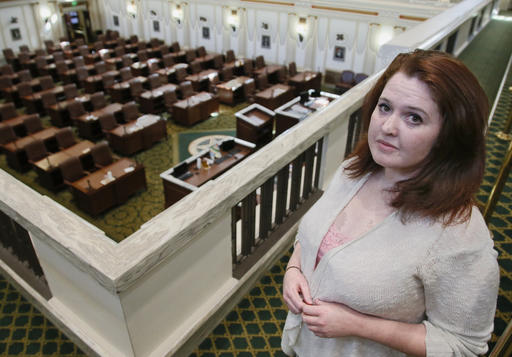OKLAHOMA CITY (AP) — When Carol Johnson landed a position as a legislative assistant in the Oklahoma House of Representatives, she saw it as an exciting step toward her goal of serving in elected office herself someday.
But the experience soon soured, Johnson says, when the member she worked for began remarking on her figure and her attire, and later asked her to send him nude photos of herself.
“He regarded me as if my education, experience, hard work and career aspirations meant nothing,” said Johnson, 37, about her time in Republican Dan Kirby’s office beginning in 2012. “And that’s heartbreaking and disgusting.”
Kirby, 58, resigned last week in the face of likely expulsion after Johnson testified before an investigating panel. But this outcome isn’t the rule in such cases. Only last year, officials confirmed, the speaker of the House opted to quietly dispose of another complaint against Kirby with no formal inquiry or discipline, instead secretly paying $44,500 to a 28-year-old female aide and her attorneys.
Sexual harassment isn’t uncommon in state legislatures, although the number of complaints has never been compiled. Men hold, on average, more than 75 percent of the seats, along with most of the positions of power, while women compose a high percentage of staff members, office employees, interns and lobbyists.
Just last month a South Dakota legislator resigned after admitting having sexual contact with two interns, and a Tennessee lawmaker was expelled last year over reported sexual advances involving as many as 22 women. Sex scandals roiled at least eight other statehouses in the last few years.
Despite persistent incidents, many legislatures lack formal procedures for dealing with sexual harassment. While corporate America, colleges and government agencies have established processes for investigating complaints, state legislatures remain an often murky domain in which top leaders have broad latitude over how or whether to pursue allegations and can sidetrack them if they choose.
In Kirby’s case, the confidential payment last year appeared in House accounts as “janitorial supplies,” which House officials later claimed was a clerical error.
State legislatures are an ideal environment for covering up sexual improprieties, so women are reluctant to report incidents, said Maya Raghu, a Washington, D.C., attorney specializing in women’s issues who has conducted research on workplace sexual harassment.
“There’s a real danger when you have one person in charge of receiving complaints, deciding whether or not to conduct an investigation, actually conducting an investigation and then deciding the resolution,” Raghu said.
In most corporate systems, workers can contact a human resources department where officials with legal training conduct an inquiry and provide due process. Penalties are set out in company policy.
“I think it sends a message that there will be accountability for harassment,” Raghu said.
Some legislatures have adopted systems for reviewing and investigating complaints, but at least 10, including Oklahoma’s, have none at all.
“As I understand it now,” said Democratic Rep. Emily Virgin, one of 13 women in the Oklahoma House, “it’s completely up to the speaker whether anything happens or not.”
In 2013, it came to light that the assembly speaker’s office in New York had been secretly making payments totaling more than $100,000 for sexual incidents involving a former lawmaker. The scandal led to an overhaul of investigative procedures.
Arbitrary systems “are not good for the integrity of a system that wants to protect victims,” said New York Assemblywoman Amy Paulin.
In Oklahoma’s statehouse, women have to fend for themselves, several members said.
“Have I had other people cross that line? Absolutely,” said Virgin, who said she has had disturbing experiences but didn’t report them.
Kirby’s case produced weeks of chaotic scrambling after news of the secret settlement was reported in The Oklahoman newspaper.
Kirby initially resigned, then rescinded his resignation, and complained he hadn’t been formally apprised of the allegations. House leaders also revealed that another member, Democrat William Fourkiller, had been the subject of a complaint in 2015 that hadn’t been disclosed. Leaders appointed a special investigating committee but the inquiry’s ground rules, requiring non-disclosure agreements, were immediately criticized.
The inquiry was designed “to allow the entire situation to be whitewashed,” said Democratic Rep. David Perryman, who refused to participate.
Former House Speaker Jeff Hickman defended concealing the earlier Kirby complaint, saying secrecy protects the privacy of those involved and that the $44,500 payment was cheaper than litigating the matter.
Responding to Johnson’s account, Kirby, who was single, maintained that he and his aide had a consensual relationship, a claim she denied.
“In hindsight, it was poor judgment to work with someone with whom I had a very close and personal relationship with for over five years, but I strongly disagree that our actions warrant my expulsion,” he said.
Fourkiller, who also denied any wrongdoing, was directed to receive one-on-one training on professional workplace conduct.
Some Oklahoma lawmakers acknowledged that members are wary of establishing any formal process for ethics issues.
“I guess too many members feel like: ‘My turn could be next, so I’m not going to go out on a limb,'” said former state Rep. Gary Banz, whose attempt in 2012 to establish a code of conduct after a bribery scandal was quickly scuttled by his colleagues.
___
Follow Sean Murphy at www.twitter.com/apseanmurphy
Copyright 2017 The Associated Press. All rights reserved. This material may not be published, broadcast, rewritten or redistributed.






